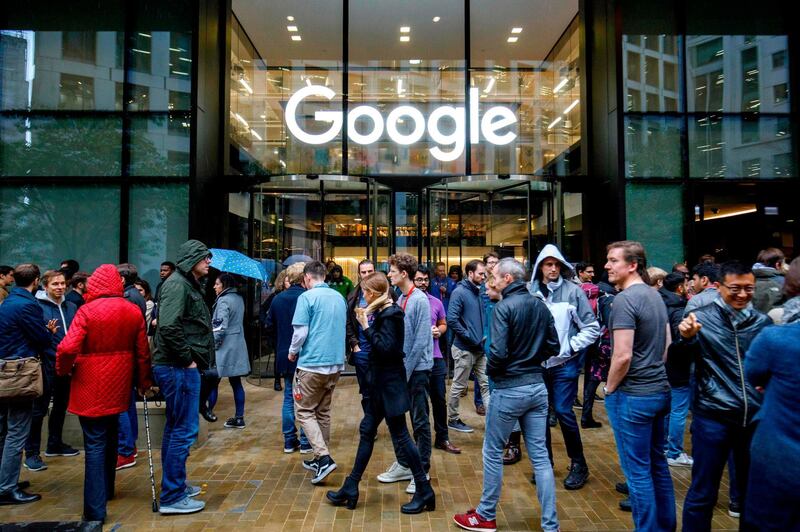Hundreds of Google staff walked out of their offices on Thursday as part of an unprecedented global protest at what staff say is a lax attitude towards allegations of sexual misconduct.
They demanded an overhaul of how the tech giant handles accusations, sparked by reports that a senior executive received a $90 million (Dh331m) severance package despite the company concluding that allegations against him were credible.
Crowds gathered outside offices in Dublin, Zurich and Tokyo to hear speakers call for change as the protests swept from east to west around the globe.
#GoogleWalkout Cambridge — seems like the whole office is here. Can't get a photo that accurately expresses the magnitude. pic.twitter.com/94rIbQJ9Ls
— Colin McMillen (@mcmillen) November 1, 2018
A member of staff, who gave her name only as Kate, told the crowd in Dublin: “While I have not personally experienced any form of sexual harassment or misconduct at Google, I wish to create a space for all of us here to gather together and show our support for doing whatever it takes to eliminate any such awful behaviour.”
The walkouts marked the latest eruption of anger at what many see as a frat house culture that permeates Silicon Valley and the male-dominated tech sector.
The protest follows allegations of sexual misconduct against senior executives published in the New York Times, which organisers say are merely the most high-profile examples of thousands more cases across the company.
The #googlewalkout in Zurich has impressive numbers! @googlewalkout pic.twitter.com/bgLHDLYfez
— Ted, ε-indistinguishable from not being there (@TedOnPrivacy) November 1, 2018
"As Google workers, we were disgusted by the details of the recent New York Times article, which provided the latest example of a culture of complicity, dismissiveness, and support for perpetrators in the face of sexual harassment, misconduct, and abuse of power," organisers said in a press release. "Sadly, this is part of a longstanding pattern, one further amplified by systemic racism."
They issued five demands, including an end to forced arbitration in cases of harassment and discrimination; a commitment to end pay inequity; and a clear, global system for reporting sexual misconduct safely and anonymously.
The protests were timed to sweep around the globe as the clock struck 11.10am local time. Instagram and Twitter accounts showed hundreds of people walking out of offices in Tokyo and Singapore, before the protest reached Zurich, London, Dublin and finally the US.
Sundar Pichai, Google's chief executive, said management told staff it was aware of the protest and would support employees who participated.
“Employees have raised constructive ideas for how we can improve our policies and our processes going forward. We are taking in all their feedback so we can turn these ideas into action,” he said.
_______________
Read more:
[ Google says it fired 48 for sexual harassment over two years ]
[ Google to give away $25 million to fund humane AI projects ]
_______________
Last week, the New York Times reported that Andy Rubin, creator of Google's Android software, received a $90m severance package in 2014 despite the company concluding sexual misconduct allegations against him were credible.
Mr Rubin denied that he had coerced a woman to have sex with him in a hotel room.
“These false allegations are part of a smear campaign to disparage me during a divorce and custody battle,” he wrote on Twitter when the story was published.
Here's one of four Google London sites coming out in support of our colleagues. #GoogleWalkout pic.twitter.com/SevBraiPrc
— Hoi Lam (@hoitab) November 1, 2018
The same article included allegations of sexual misconduct elsewhere in the company.
Richard DeVaul, a director at a Google-affiliated lab that worked on projects such as self-driving cars and balloons that beam the internet to users, was accused of inviting a prospective staff member to the Burning Man festival where he allegedly asked her to remove her shirt.
Google said Mr DeVaul resigned on Tuesday without severance pay.
The allegations brought a string of apologies from the company.
Mr Pichai sent an email to staff on Tuesday saying: "I understand the anger and disappointment that many of you feel.
“I feel it as well, and I am fully committed to making progress on an issue that has persisted for far too long in our society ... and, yes, here at Google, too.”
Another email tried to reassure staff that the issue was being taken seriously. It detailed how Google had fired 48 employees, including 13 senior managers, without giving any of them pay-offs.
I'm walking out tomorrow with thousands of my coworkers because I believe it's past time for this abuse to stop. It's clear neither government nor business leaders will fix this on their own. We have to do this ourselves y'all. #googlewalkout ✊🏻✊🏼✊🏽✊🏾✊🏿https://t.co/PCtYo7Ieuk
— Amr Gaber (@amrtgaber) November 1, 2018
However, that does not go far enough for the estimated 1,500 people who joined the walkout.
One employee in London said: “It's not necessarily the senior executives that are a problem but the structures that are in place - this is a call for change.
“I would really like to believe, given what we've seen today at Google offices, that things will change but I can't say I'm 100 per cent confident.
“Things like this are complicated and there isn't going to be an issue that changes overnight - it’s really a question of time.”
Last year Google was rocked by a sexism scandal when a software engineer rubbished the company's efforts to increase the number of minorities and women in its ranks. James Damore wrote that the lack of women in senior positions was not down to discrimination but "genetic differences" in female preferences and abilities.
“These differences may explain why we don’t see equal representation of women in tech and leadership,” the engineer wrote in an essay published on an internal forum.
_______________
Read more:
[ Topshop's Philip Green named over harassment allegations ]
[ Morocco’s MeToo moment #Masaktach builds momentum ]
_______________






